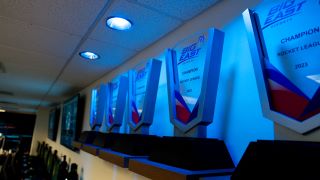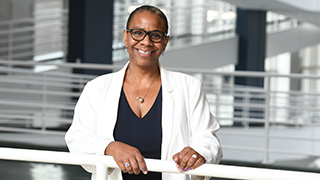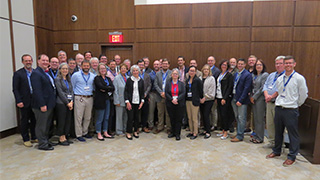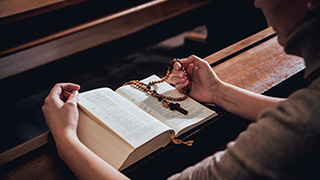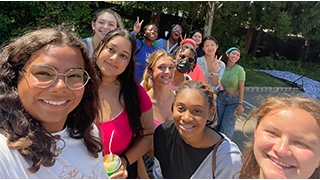Record number of students complete service through CCRE’s virtual service-learning program - Seton Hall University
Tuesday, November 2, 2021
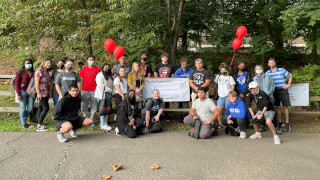
Students from the CCRE’s service-learning program and the Social Work Students Association participated in the 23rd annual Red Ribbon Day and Drug Prevention Walk in Cranford, NJ in October 2021. A generous donation from the College of Arts and Sciences enabled Mary Landriau, Faculty Associate; Shelia Riley, Assistant Dean of Finance and Business Administration; and Timothy Hoffman, Director the Center for Research and Engagement, to facilitate the participation of students in the event.
A record 445 students participated in the Center for Community Research and Engagement (CCRE)'s service-learning program, completing 2,948 hours of service during the 2020-2021 school year. By leveraging virtual opportunities to continue service work, the program grew despite obstacles posed by pandemic restrictions and hybrid learning.
The CCRE, founded in 1997, operates out of the College of Arts and Sciences and coordinates the activities of the University as it implements service learning and community-based research on campus. Service learning is a pedagogical tool used to "encourage students to engage and empower communities through service and gain perspectives to help augment their coursework," the Center's Executive Director Roseanne Mirabella, Ph.D., said.
Incorporated into 15 sections of Journey of Transformation in the fall 2020 semester and in six sections of Christianity and Cultures in Dialogue in the spring 2021 semester, the 445 students participated in completely virtual service opportunities.
Due to the COVID-19 pandemic, the CCRE adapted to serve the community in new ways. Director Timothy Hoffman '15/M.P.A.'16 shared that Seton Hall was largely alone in its efforts to continue providing students service-learning opportunities during the pandemic. When Hoffman reached out to over 70 universities with similar programs to see how they were navigating service during a pandemic, he said many responded that they were not running those opportunities.
"We started reaching out to our nonprofit connections and saying, 'We don't know how this is going to work, but how can we help you right now?'" Hoffman said. "We were able to get out there and still help the nonprofits virtually. We've actually grown with how many students we've had in the last year and how many place we were able to work with," he said.
The CCRE worked virtually with 25 community partners and programs during the 2020-2021 school year, adding 15 organizations since the 2019-2020 school year, according to Hoffman. This growth allowed Seton Hall students to be servant leaders to communities and organizations from a local to a national level in a time of need for many.
As part of the service-learning program, some students transcribed documents through the Digital Volunteers Programs of the Smithsonian and the Library of Congress, while others wrote letters to senior citizens in nursing homes, inmates in detention, and COVID-19 patients in hospitals. Another group created read aloud videos for elementary school classrooms and others participated in a data mapping volunteer program offered through the Seton Hall University Library.
"The students then bring this range of experiences back to the classroom both for discussion and in their writing for the class. In these writing assignments, students reflect on their service experiences and how these experiences relate to the readings and the questions of the courses," explains Elizabeth Redwine, PhD, a lecturer in the department of English who leads service-learning sections in her Journey for Transformation and Christianity and Cultures in Dialogue courses.
In addition to widening perspectives in the classroom, service learning also empowers students to be servant leaders and helps them grow. Claudia Romani, a senior in the dual degree program for psychology and speech language pathology and a Community Engagement Leader, working with the CCRE to organize student volunteers, shared why she thinks the program is so impactful to students.
"Service learning generates this feeling in them that their work is meaningful because of the impact it can have on others," Romani said. "Through service, students see firsthand the needs of communities and they grow a desire to want to do something about it."
Echoing Romani's sentiment, alum Jaylen Henderson-Peña, '21, said volunteering and eventually working with the CCRE team as a Community Engagement Leader led him to change his course of study to special education and helped him develop personally and professionally.
"My engagement with these programs made me realize that it is my civic duty to serve my community. I learned the value of cooperative work in the office with my coworkers and out in the community while serving among other volunteers and community leaders," Henderson-Peña said. "I also gained immense leadership experience early in my collegiate career as I developed program curriculum, managed volunteer sites and led committee teams. CCRE played a critical role in my establishment as an educator, as I currently teach fifth grade math in Orange."
Due to the growth of opportunity last year, the CCRE continues to offer its over 344 participating students this semester virtual service opportunities. Student can also choose from several in-person service programs, with those opting for in-person programs required to follow both the University's and the nonprofit organization's COVID-19 requirements to ensure a safe and healthy experience for all involved.
Through the service learning, students are positively impacted as they improve the lives of those in nearby communities. "It's really life-altering, the work we do," Mirabella said.
To learn more about service learning at the CCRE, click here or contact Hoffman at [email protected].
Categories: Arts and Culture, Education

